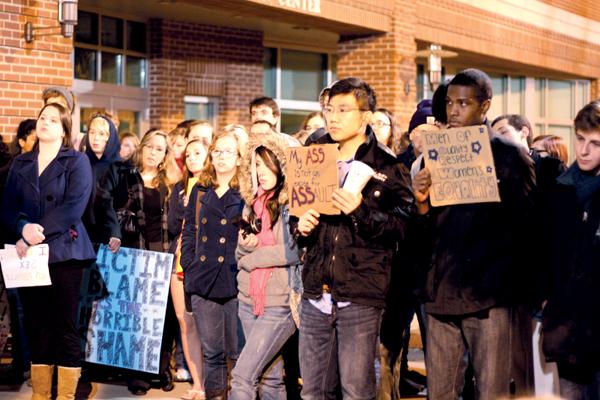
Despite bitter 30-degree weather last Friday night, about 100 Binghamton community members took part in Binghamton’s first “SlutWalk,” an event protesting rape and the blaming of victims of sexual assault.
Similar events have sprung up in cities around the world after activists in Toronto staged the first SlutWalk protest in April. They launched the protest after a safety forum in January at Toronto’s York University where Canadian police officer Michael Sanguinetti said that “women should avoid dressing like sluts in order not to be victimized.”
Binghamton’s SlutWalk was organized by students enrolled in “PIC280N: Feminism and Activism” this semester with Dara Silberstein, executive director of BU’s women’s studies program and a visiting assistant professor.
Protesters gathered at the Binghamton University Downtown Center at 7 p.m.
Prior to the walk, the eight students in the class gathered the crowd together and encouraged participants to step up and share their stories of sexual assault or abuse. Those who shared their stories spoke through a megaphone. Following each account, the crowd responded with applause and vocal support.
They concluded their segment by declaring in unison, “My expression of my sexuality is not an invitation.”
The SlutWalk participants then walked through several streets of Downtown Binghamton, repeating chants led by Olivia Santoro, a sophomore double-majoring in sociology and geography and a student in Silberstein’s class. Onlookers turned their heads and people stepped outside of bars on State Street to watch as the crowd shouted, “Even a hoe can say no,” and, “My short dress does not mean yes.”
“It’s our responsibility to raise awareness,” said Rachel Lutjen, a freshman student in the class.
Lutjen and Santoro said they think the SlutWalk movement is tied in with their lessons on community organizing. They worked with their fellow students in “Feminism and Activism” to advertise the walk for about three to four weeks in advance through press releases and flyers. They wore T-shirts Friday that read, “Binghamton SlutWalk.”
Their efforts caught the attention of Eve Arnold, a junior at Seton Catholic Central High School in Binghamton, who learned about the walk through an email sent by a friend. She attended the walk with wrapped condoms taped to her face, which she said were to protest the notion that women who carry condoms on them are “sluts.”
“I’d like for society to change what they teach from ‘Don’t get raped’ to ‘Don’t rape,'” she said.
Arnold said the feminist movement has always played a part in her life, thanks to the teachings of her mother, who was unable to attend Friday’s march because of out-of-town work.
There has been some debate among the feminist community surrounding the incorporation of the word “slut” in the title of the SlutWalk protests.
Some activists have said they want to reclaim the term “slut” from its derogatory connotations by transforming it into an acronym for “Strong Ladies United Together.” Others contest that “slut” is an irredeemable insult used by misogynist men that should be dismissed altogether.
Silberstein said she is sympathetic to both sides, but most of all she firmly believes that “women should be able to dress how they want without fear of rape or molestation.”
Melvin DeBottis, the treasurer of the Women’s Student Union and a senior majoring in English, came to the walk wearing a white T-shirt with the letters “S-L-U-T” written across it.
“There doesn’t have to be a reason why they [women] dress. And if they do dress that way, who cares?” DeBottis said as he held a sign that read, “Stop Blaming the Victim.”
DeBottis was one of the few men in attendance at the walk. He said he believes men need to help break down notions that a woman’s outfit is an open invitation for sexual assault.
“Men should be here to break the stereotype,” he said.
Silberstein said she hoped the march would help to alter unfair perceptions about rape victims.
“I think the students did a terrific job in organizing the walk and I hope that it raised some degree of awareness in those who may not have thought about sexual abuse of women and of how women are treated simply because of the way they dress,” she said. “Participants seemed to express enthusiasm for the event and my class members experienced a real sense of solidarity in working with each other to make this event possible.”


